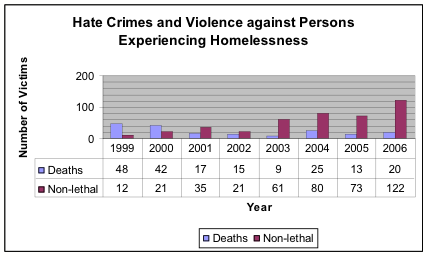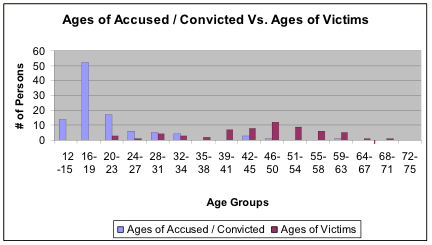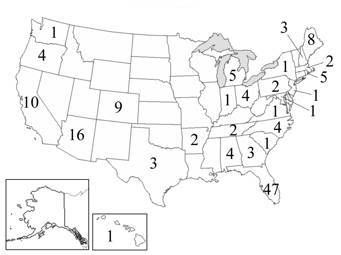Hate, Violence, and Death on Main Street USA February 2007
Violent Crimes against the Homeless on the RiseContact: Michael Stoops (202) 462-4822, ext. 19; mstoops@nationalhomeless.org
Please click here to read the hate crimes report.Please click here to read the CNN story:
"Teen 'sport killings' of homeless on the rise"Washington, DC � Reported incidents of attacks against homeless men and women have reached their highest level in years, according to a study by the National Coalition for the Homeless. NCH�s report,
Hate, Violence, and Death on Main Street USA: A Report on Hate Crimes and Violence Against People Experiencing Homelessness 2006, details the 142 violent crimes, against homeless individuals in the past year, the highest number of incidents since NCH�s annual study began in 1999. Attacks have increased 65% from last year, and over 170% since five years ago. This year�s attacks, which include beatings, stabbings, burnings, and rape resulted in 20 fatalities
Even more disturbing than the violence of these attacks are the identities of the attackers and their motives. In a significant number of cases, the crimes were committed by teenagers and young adults, for no apparent reason other than boredom. This March in Orlando, FL, August Felix, age 54, was beaten to death by five teenagers. The youths, all between the ages of 13 and 16, attacked Felix and others �for sport,� according to local police. Later that same month, 21-year-old Braymond Harris of Detroit was shot and killed by a 15-year-old boy. In the words of one Detroit police officer, the boy and his friends �just wanted to beat up a bum.�
�It is NCH�s position that many of these acts should be considered hate crimes� said Michael Stoops, Executive Director of NCH. �Crimes against homeless people are motivated by the same intolerance as hate crimes against people of a certain religious, racial, or ethnic background.�
Currently, federal law does not list housing status as potential motivation for a hate crime, though NCH and others are gaining ground in their battle to add homelessness to new hate crimes legislation. Such bills have been introduced into five state legislatures: California, Florida, Maryland, Massachusetts, Nevada, and Texas.
For the complete report, as well as those of past years, click
here

 http://www.nationalhomeless.org/getinvolved/projects/hatecrimes/pressrelease.html
http://www.nationalhomeless.org/getinvolved/projects/hatecrimes/pressrelease.html~ ~ ~ ~ ~ ~ ~ ~ ~ ~ ~ ~ ~ ~ ~ ~ ~ ~ ~ ~ ~ ~ ~ ~ ~ ~ ~ ~ ~ ~ ~ ~ ~ ~ ~ ~ ~ ~ ~ ~ ~ ~ ~ ~
Get involved:
http://www.nationalhomeless.org/getinvolved/index.htmlResources:
http://www.nationalhomeless.org/resources/index.html The Perils of IndifferenceElie Wiesel
(excerpt)
In a way, to be indifferent to that suffering is what makes the human being inhuman. Indifference, after all, is more dangerous than anger and hatred. Anger can at times be creative. One writes a great poem, a great symphony, one does something special for the sake of humanity because one is angry at the injustice that one witnesses. But indifference is never creative. Even hatred at times may elicit a response. You fight it. You denounce it. You disarm it. Indifference elicits no response. Indifference is not a response.
Indifference is not a beginning, it is an end. And, therefore, indifference is always the friend of the enemy, for it benefits the aggressor -- never his victim, whose pain is magnified when he or she feels forgotten. The political prisoner in his cell, the hungry children, the homeless refugees -- not to respond to their plight, not to relieve their solitude by offering them a spark of hope is to exile them from human memory. And in denying their humanity we betray our own.
Indifference, then, is not only a sin, it is a punishment. And this is one of the most important lessons of this outgoing century's wide-ranging experiments in good and evil.
In the place that I come from, society was composed of three simple categories: the killers, the victims, and the bystanders. During the darkest of times, inside the ghettoes and death camps -- and I'm glad that Mrs. Clinton mentioned that we are now commemorating that event, that period, that we are now in the Days of Remembrance -- but then, we felt abandoned, forgotten. All of us did.
And our only miserable consolation was that we believed that Auschwitz and Treblinka were closely guarded secrets; that the leaders of the free world did not know what was going on behind those black gates and barbed wire; that they had no knowledge of the war against the Jews that Hitler's armies and their accomplices waged as part of the war against the Allies.
If they knew, we thought, surely those leaders would have moved heaven and earth to intervene. They would have spoken out with great outrage and conviction. They would have bombed the railways leading to Birkenau, just the railways, just once.
The full speech (text & audio) is available @
http://www.historyplace.com/speeches/wiesel.htm Today, a different time, a different place.
We know.
What will we do?